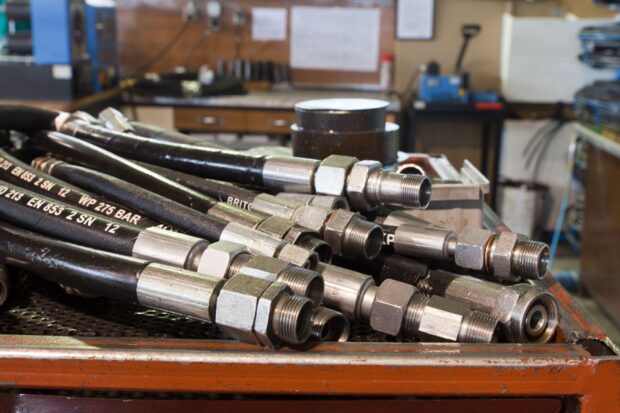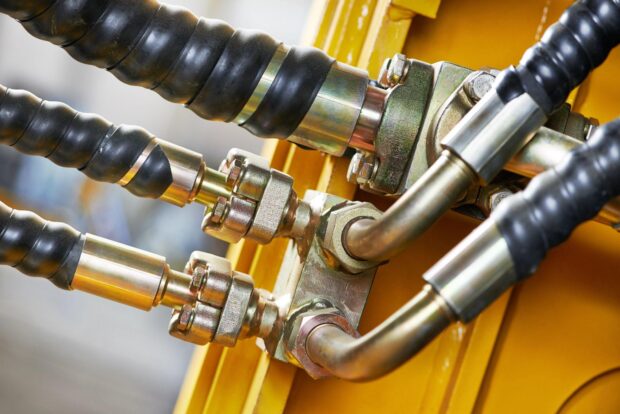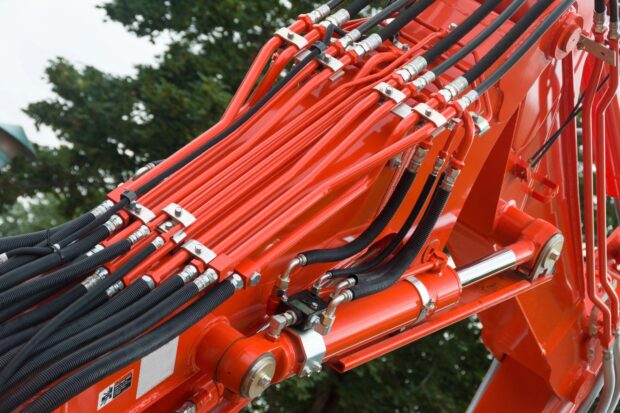Maximizing Durability and Performance: Essential Tips for Hydraulic Hose Maintenance
By blog admin | in Uncategorized
Let's face it: hydraulic systems are the lifelines of heavy machinery, and are important components across a broad spectrum of industrial applications. These systems just wouldn't operate without durable and reliable hydraulic hoses.
Just like the human body's veins and arteries, hydraulic hoses transport essential fluid to ensure the machinery's optimal functioning.
Ignoring the need for hydraulic hose maintenance can lead to catastrophic failures, costly downtime, and safety hazards. To prevent these kinds of risks, you need to have a robust maintenance routine.
Here's how to do it.
What is the Importance of Hydraulic Hose Maintenance?

Before we jump into maintenance tips, it's important to recognize the critical role hydraulic hoses play in machinery operation.
Hoses not only transmit power to various components but also provide flexibility, allowing the system to absorb shocks and vibrations.
They endure extreme pressure, temperature, and environmental conditions, making preventive maintenance not a luxury - but an absolute necessity.
Regular hydraulic hose protection and maintenance can:
- Enhance Safety: A burst hydraulic hose can release pressurized fluid at high velocity, posing a significant safety threat to anyone nearby.
- Prevent Downtime: Hoses are often single points of failure. Regular inspections can catch issues before they escalate, avoiding unexpected downtime.
- Reduce Operational Costs: A well-maintained hose system operates efficiently, reducing energy consumption and lowering long-term repair costs.
- Prolong Hose Life: According to industry experts, providing meticulous care to hoses can extend their lifespan significantly.
10 Essential Tips for Hydraulic Hose Maintenance

Now that you know all the reasons to keep tabs on your hydraulic hoses, here are a few tips to help you do it.
1. Put a Hydraulic Hose Preventive Maintenance Plan in Place
Before anything else, put together a clear maintenance schedule. Just like going to the doctor for regular check-ups, your hydraulic hoses need consistent attention.
Map out a plan that covers who will do the inspections and when they should happen. This plan is like your checklist; it helps you stay on track and makes sure nothing gets missed.
2. Do Visual Inspections on a Regular Basis
Routine visual checks can reveal damage, wear, or leaks. Pay attention to the hose's flexibility, color, and fittings.
Any abnormalities - such as cracks, abrasions, or bulges - indicate the need for immediate attention. Check the hoses often. Do they still bend like they used to? Are they changing color? If you see cracks, scrapes, or weird bulges, it's time to do something about it.
3. Prevent Contamination
Keep the area around your hoses as clean as possible. You wouldn't want dirt in your drinking water - your hydraulic system feels the same way. Dirt or other gunk can wear out your hoses faster and make your machines run less efficiently. Simple things like changing filters regularly can make a big difference.
4. Watch for Leaks
Even small leaks can signify (or morph into) a larger problem. Aside from messy oil spills, leaks can hint at bigger problems hiding in your machinery.
5. Maintain the Correct Hydraulic Fluid Temperature
Excessive heat or cold can hasten the degradation of the hose material. Make sure that the hydraulic fluid is maintained within the recommended temperature range for the system.
6. Track the Lifecycle of Each Hose
Write down everything about your hoses—when they started working, what kind of life they've lived, and any time they've been fixed.
Keeping good records helps you plan for the future and know when it's time to retire the old one and get a new hose.
7. Avoid Exceeding Pressure Ratings
Making your hydraulic system work harder than it should is a no-go. It's like putting too much air in a balloon, it will pop.
Regularly check your pressure gauges and make sure that all system components are within their designated ranges.
8. Perform Functionality Tests
Every now and then, perform some functionality tests, such as checking for kinks, twists, and tension under working conditions. This can identify potential issues that might not always be evident during static inspections.
9. Replace Defective Hoses ASAP
When a hose starts looking even a little bit rough, don't wait - swap it out with a new one immediately. Having a schedule for replacing hoses can help, too, because some hoses might look fine at first glance, but are actually starting to get old and tired on the inside
10. Know How to Repair Hydraulic Hoses (and When to Do It)
When it comes to hydraulic hoses, knowing whether to repair a damaged hose or outright replace it is crucial. Small issues, such as minor abrasions or loose fittings, can often be repaired if caught early.
However, if your hoses exhibit significant wear, leakage, or damage, replacement is the safer bet. Incorporating hose inspection and repair into your regular maintenance plan is essential to help give you an idea of when repairing or replacing will be the better option.
9. Replace Defective Hoses ASAP
When a hose starts looking even a little bit rough, don't wait - swap it out with a new one immediately. Having a schedule for replacing hoses can help, too, because some hoses might look fine at first glance, but are actually starting to get old and tired on the inside
Pro Tip: Always Keep Spare Hydraulic Hoses on Hand

Our best tip for hydraulic hose maintenance? Be ready for anything.
Being prepared for sudden hose failures can be the difference between a minor inconvenience and a major operational disruption. Having spare hoses readily available allows you to make quick replacements, getting your system back online with minimal delay.
At the end of the day, maintaining and replacing hydraulic hoses is a complex and crucial task. In order to make sure that the materials used for replacements are top quality and compatible with your equipment, you need to work with a reputable supplier.
For the finest selection of hoses, fittings, and accessories, you can always count on Hose and Fittings – your one-stop shop for all hydraulic and pneumatic fluid power needs.
Don't compromise on the integrity of your hydraulic system. Follow these tips to establish an effective maintenance regimen for your hoses and enjoy the peace of mind that comes with an optimally functioning hydraulic system.

